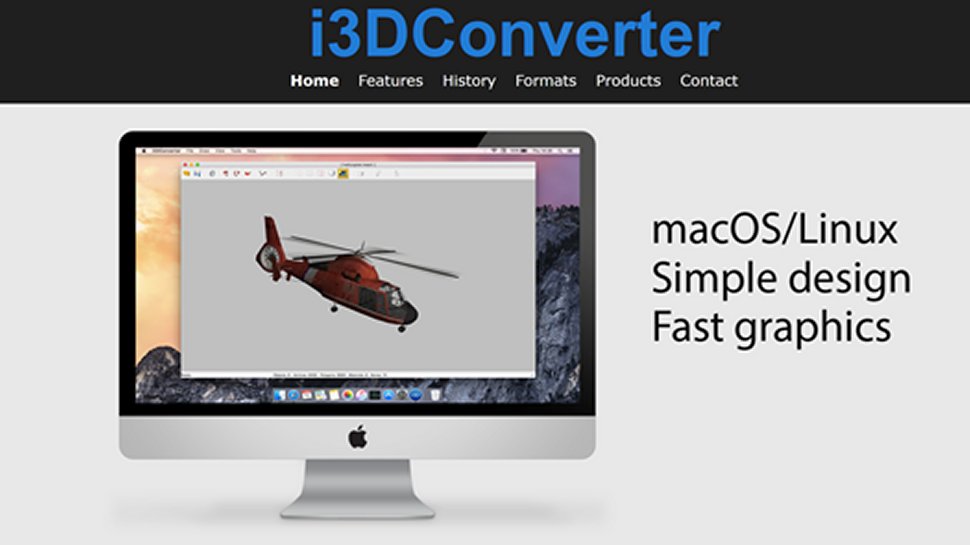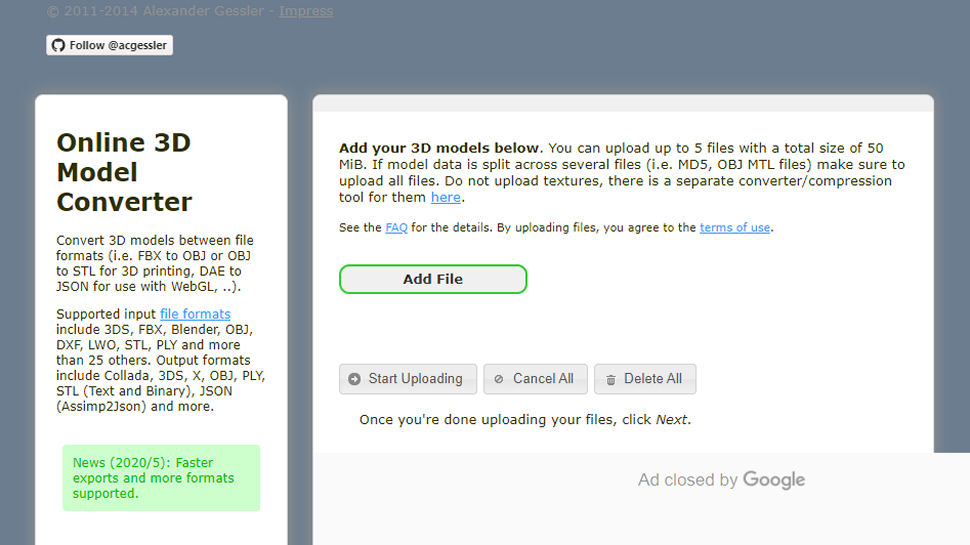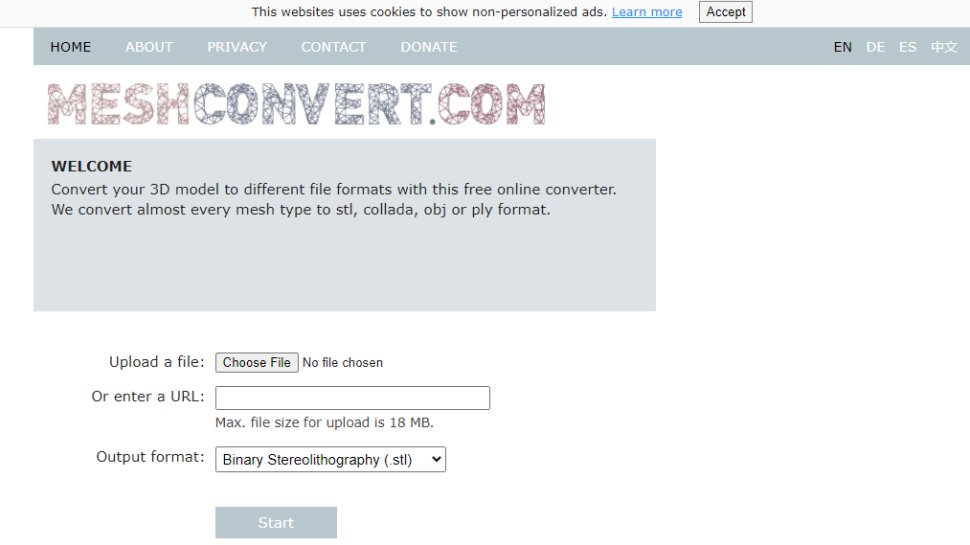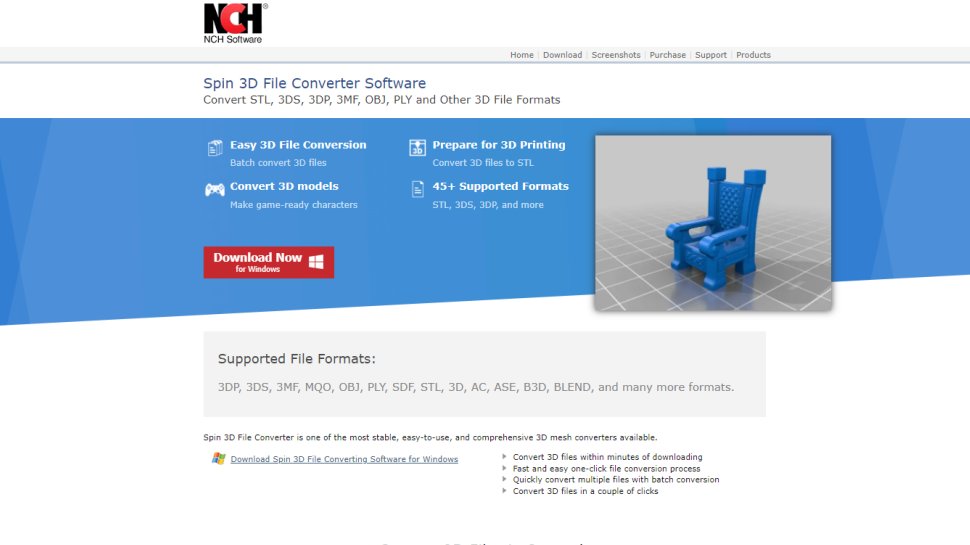Best 3D file converter of 2026:
Free and paid, for Windows, Mac, Linux, and online

We list the best 3D file converters, to make it simple and easy to save 3D files as different compatible formats, including proprietary ones for use in other applications.
The best 3D file converter is essential for professionals working across various design disciplines, enabling a seamless transition between different 3D file formats for use in a wide array of applications.
As the landscape of 3D design has grown, so too has the diversity of file formats, with major software publishers like AutoDesk and Blender developing their proprietary formats, while neutral formats aim to ensure compatibility across the best architectural software, best 3D modeling software, and best interior design software.
The proliferation of these file types underscores the necessity for a robust 3D file conversion tool, particularly for those involved in 3D design, animation, or utilizing 3D printers. The ideal converter should offer flexibility in converting between all major proprietary and neutral formats, including the STL format, which is commonly required for 3D printing projects.
Our guide is dedicated to alleviating the complexity of managing diverse 3D file types by spotlighting the best 3D file converters available today. These tools are invaluable for ensuring that your design workflow remains efficient and integrated, regardless of the specific software tools or platforms you use.
The best 3D file converter of 2026 in full:
Why you can trust TechRadar
The best 3D file converter overall
1. i3DConverter
Reasons to buy
Reasons to avoid
If you want a single 3D file converter that can handle every file format under the sun, look no further than i3DConverter. This desktop software supports more than 760 file formats. Not all of those are supported for both input and output, but many are. That makes this file conversion software much more versatile than just about any other tool on the market.
The software itself is also quite packed with features. i3DConverter has a batch input module for converting large numbers of 3D files, and you can load files into the software simply by dragging and dropping. There’s a built-in file viewer that lets you preview the input you’re converting, although you cannot see a preview of the output before the conversion takes place. In addition, you can access i3DConverter from the command line.
As you might expect, i3DConverter isn’t free. But it is very reasonably priced, and the software is available for Windows, Mac, and Linux.
The best free 3D file converter
2. Greentoken
Reasons to buy
Reasons to avoid
Greentoken offers an impressive range of file support for a free online tool. The platform can handle any of 52 3D file format inputs, including all of the most popular proprietary and neutral formats. What’s particularly nice about it is that it also supports a wider variety of outputs than other free tools. You can convert files to STL, STLB, COLLADA, OBJ, 3DS, PLY, JSON, and X. Notably, though, conversion to 3DP is not supported by Greentoken.
The online interface does support batch conversion, but you can only upload a maximum of five files at a time. Helpfully, if your model is split into multiple files, the batch upload can be used to provide Greentoken with all the necessary files at once. Uploads and downloads are relatively speedy, although the limit of 50 MB for uploads can be problematic if you have large 3D files.
The best 3D file converter for mesh files
3. Meshconvert
Reasons to buy
Reasons to avoid
If you’re looking for a completely free 3D file converter, Meshconvert is a good place to start. As the name suggests, this program is designed solely for mesh files and not constructive solid geometry files. It currently supports around 37 input file formats, including Blender BLEND files, AutoCAD DXF files, and neutral STL and OBJ files.
The downside to Meshconvert is that the file types you can convert to are relatively limited. Meshconvert only converts 3D files to STL, OBJ, COLLADA, and PLY file types.
Meshconvert is hosted online, so there’s no need to download a program. That makes this solution quick and simple for small files. If the 3D file you want to convert is hosted online, you can also give Meshconvert the URL to avoid another upload.
The best 3D file converter for batch conversion
4. Spin 3D
Reasons to buy
Reasons to avoid
Spin 3D from NCH Software is one of the best desktop-based file converters around. But, it’s extremely fast and powerful and covers a wide range of conversion needs.
This software takes inputs in any of 45 different file formats, including most common proprietary formats. The file types you can convert to are much more limited—there are only six of them—but Spin 3D includes outputs in 3DP and 3DX in addition to STL and OBJ formats.
What really sets this 3D file converter apart are the features built into the desktop software. Before you run a conversion, you can preview both the original 3D design and the anticipated output design to make sure it will render accurately. On top of that, Spin 3D enables you to batch convert files using multiple processor threads.
The best 3D file converter for large files
5. Online CAD Converter
Reasons to buy
Reasons to avoid
If you’re willing to pay for file conversion, it’s worth taking a look at Online CAD Converter. This web-based conversion tool lets you convert one file for free, then charges a modest fee per file after that. Unlike other online tools, Online CAD Converter supports large files—you can upload files up to 100 MB in size.
The main reason to go with this 3D file converter over a free tool is that it supports an incredibly wide variety of file types. In addition to the graphical formats that most converters cover, Online CAD Converter can accept files from Inventor (SLDPRT), Inventor (IPT), Pro/ENGINEER (ASM), NX (PRT), and more. You can output designs in five standard formats including COLLADA, STL, 3DP, 3DS, and OBJ.
The best 3D file converter FAQs:
How to choose
When deciding which of the best 3D file converter to download and use, first consider if a free or budget software program will suit you fine. However, if you plan to develop a 3D your converted file further using a series of complicated models using advanced tools and filters, it may be better to aim for one of the higher range and more expensive modelling programs on our list.
How we tested the best 3D file converters
To test for the best 3D file converter we first set up an account with the relevant software platform, whether as a download or as an online service. We then tested the service using a handful of files to see how the software could be used for converting different file formats. The aim was to push each software platform to see whether it could simply and easily not just convert a range of content types but also do so faithfully and consistently without introducing errors.
Read how we test, rate, and review products on TechRadar.
Get in touch
- Want to find out about commercial or marketing opportunities? Click here
- Out of date info, errors, complaints or broken links? Give us a nudge
- Got a suggestion for a product or service provider? Message us directly
- You've reached the end of the page. Jump back up to the top ^
Sign up to the TechRadar Pro newsletter to get all the top news, opinion, features and guidance your business needs to succeed!
Michael Graw is a freelance journalist and photographer based in Bellingham, Washington. His interests span a wide range from business technology to finance to creative media, with a focus on new technology and emerging trends. Michael's work has been published in TechRadar, Tom's Guide, Business Insider, Fast Company, Salon, and Harvard Business Review.
- John LoefflerComponents Editor





